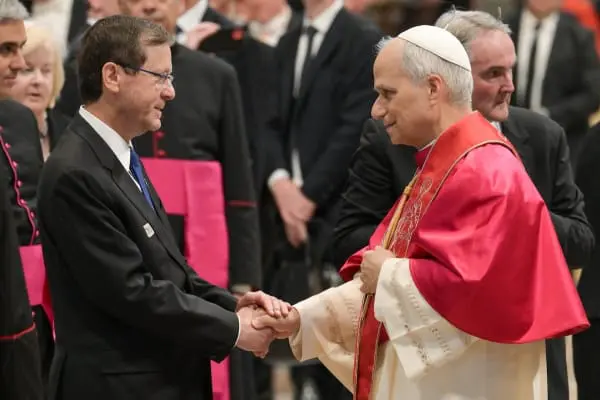
Israeli President Isaac Herzog is greeted by Pope Leo XIV, May 18, 2025. (Photo: Ma’ayan Toaf/GPO)
The election of a new pope – American-born Robert Prevost, who has taken the name Leo XIV – opens the door to a potential reset in relations between the Jewish community and the Catholic Church, which had grown increasingly tense in the final years of the late Pope Francis.
Israeli President Isaac Herzog attended the inauguration ceremony of Pope Leo XIV on Sunday, which was held at the Vatican.
During his attendance at the ceremony, the president wore a yellow hostage pin along with a sticker, marking the number of days the hostages have been held in captivity in Gaza. His office described it as “a gesture of solidarity with the families and a cry for their immediate release, urging the global community to take action for their return.”
As Herzog was introduced to Pope Leo, shaking his hand, he thanked him for choosing to begin his papacy with a call for the immediate return of all hostages held in Gaza. Herzog also urged the pope to continue working for their release and to promote the renewal of interfaith dialogue. At the conclusion of their conversation, Herzog invited the pope to visit the Holy Land.
Congratulations @Pontifex Pope Leo XIV.
Thank you for your call for the release of the hostages held in captivity in Gaza for 590 days.
I look forward to working with you to strengthen the relationship between all faiths.
And I look forward to welcoming you in the Holy Land. pic.twitter.com/y6lpJY7ijz
— יצחק הרצוג Isaac Herzog (@Isaac_Herzog) May 18, 2025
Speaking on Monday morning at the World Jewish Congress assembly in Jerusalem, Herzog referenced the sticker he wore during his meeting with the pope and welcomed the decision to resume humanitarian aid to Gaza.
Yesterday, I met with Pope Leo XIV, and the sticker I wore on my suit — bearing the unfathomable number 590 — reflected the scars we all carry in our hearts.
We need them home, now.
We salute the brave IDF soldiers who are fighting at this very moment. We stand with them send… pic.twitter.com/rEKII48let
— יצחק הרצוג Isaac Herzog (@Isaac_Herzog) May 19, 2025
Meanwhile, around the same time, Pope Leo XIV was meeting with a group of religious leaders of other faiths, where he reaffirmed the “special relationship” that Christians have with Judaism.
“Because of the Jewish roots of Christianity, all Christians have a special relationship with Judaism,” he said.
In his discussion with the religious leaders, Pope Leo XIV referred to Nostra Aetate, a declaration by the papacy in 1965, which sought to repair relations between the Catholic Church and Judaism.
Among its statements, Nostra Aetate rejected the accusation that the Jewish people were responsible for the death of Jesus, recognized the legitimacy of Judaism, and condemned antisemitism.
While mostly focusing on the relationship between the Catholic Church and the Jews, it also briefly addressed the Church’s attitude towards Buddhism, Hinduism, and Islam.
“The conciliar Declaration Nostra Aetate (no. 4) emphasizes the greatness of the spiritual heritage shared by Christians and Jews, encouraging mutual knowledge and esteem,” Pope Leo XIV said at the meeting.
“The theological dialogue between Christians and Jews remains ever important and close to my heart,” he continued. “Even in these difficult times, marked by conflicts and misunderstandings, it is necessary to continue the momentum of this precious dialogue of ours.”
Jewish leaders from the American Jewish Committee, B’nai B’rith International, the Conference of European Rabbis, and the Jewish Community of Rome were among the religious leaders who met with Pope Leo earlier this morning.
Jewish leaders expressed appreciation for Pope Leo’s desire to meet with them, especially after his predecessor, Pope Francis, received significant criticism over his response to the Oct. 7, 2023, Hamas attacks on Israel.
Rabbi Noam Marans, the American Jewish Committee’s director of interreligious affairs, who had received a letter from Pope Leo describing the importance of dialogue and cooperation, was optimistic.
“No pope had ever written to an American rabbi in this way,” Marans told the Associated Press. “The success of the post-Council Jewish-Catholic relations is demonstrated better in the United States than anywhere else.”
The leaders were also impressed that Pope Leo specifically mentioned the Israeli hostages in Gaza, calling for their release, along with a ceasefire agreement.
In the Mass, he called for an immediate ceasefire in Gaza, and for humanitarian aid to be provided to the “exhausted civilian population and all hostages be freed.”
In a special blessing after the Mass, Pope Leo referred to “those who suffer because of wars” while referencing Gaza, Myanmar, and Ukraine, but not specifically mentioning the hostages.
“The suffering of innocent non-combatants in any conflict is a tragedy,” Marans said after the Mass.